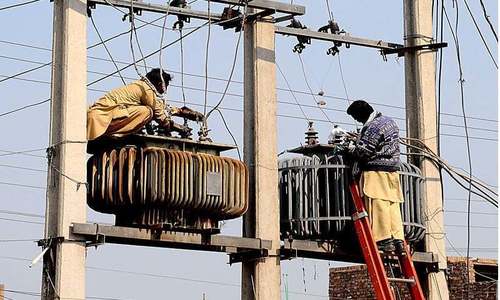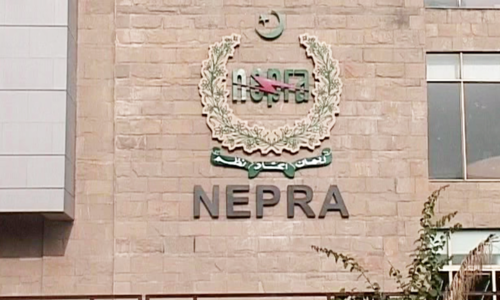ISLAMABAD: The government has cleared Rs200 billion of the circular debt that had swelled to well over Rs1.64 trillion to slightly improve cash flows of the entire energy sector including oil, gas and electricity companies.
The largest chunk, of Rs60bn, flowed to Pakistan State Oil (PSO) followed by Rs54bn to all the independent power producers (IPPs) put together and Rs25bn to Pakistan LNG Ltd (PLL) for onward payments to fuel suppliers, confirmed Power Division Joint Secretary Zargham Eshaq Khan. The amount of Rs200bn was raised by a consortium of Islamic banks through a sukuk issue last week.
He said Rs23bn were paid to Wapda Hydro, Rs22bn to coal suppliers, Rs12bn to nuclear power plants and Rs3bn to gas companies. He said the principal debt against the Power Holding (Pvt) Limited (PHPL) fell by Rs200bn and its debt servicing cost reduced significantly to Kibor plus 0.8 per cent from previous rate of Kibor plus 4.5pc. Mr Khan said some funds were also paid to the public sector generation companies that ultimately went to PSO after book entries.
PSO gets Rs60bn against expectation of Rs100bn
The PSO separately confirmed in a notice to the Pakistan Stock Exchange that it had received Rs60bn as partial settlement of receivables from power sector companies. “Consequently, the PSO’s principal receivables balance from these power sector companies has reduced accordingly. The amount received by the company has been used for partial repayment of its bank borrowing,” the company said.
Officials in the Petroleum Division said the oil company was not happy with the quantum of payments and had been expecting at least Rs100bn out of the total Rs200bn Sukuk as promised earlier but some influential members of the energy sector task force were able to divert higher amounts to IPPs and PLL. “This will not improve PSO’s liquidity. However, the funds improved its cash flows a bit as it was able to clear some international letters of credit and dues to local refineries,” said an official.
As a result, PSO’s total receivables dropped from a record 372bn at the end of last month to Rs312bn on March 1. Receivables from generation companies dropped from about Rs160bn to Rs131bn while dues from Hub Power Company Ltd fell to Rs52bn from more than Rs66bn last week. Likewise, the receivables from Kot Addu Power Company also dropped from Rs42bn to Rs17bn.
PSO’s payables to local refineries dropped from Rs16bn to Rs13bn whiles its outstanding payments to international suppliers fell from Rs43bn to Rs28bn as of March 1. Yet, the PSO’s total international obligations stood at Rs44bn when compared to Rs57bn last week, the officials explained.
The delay in the launch of sukuk had put the entire energy sector on the verge of collapse as power sector receivables climbed to Rs1.64tr at the end of January from about Rs1.3tr at the end of September 2018.
Finance Minister Asad Umar had promised payment of Rs200bn to the energy sector in November last year but two factors caused the delay in fund raising. First, the finance ministry was expecting the launch of Islamic sukuk no later than Jan 10-15 based on a decision taken by the Economic Coordination Committee of the cabinet early December last year but this did not materialise due to last-minute differences over return on profit following ensuing hikes in the policy rate by the State Bank of Pakistan (SBP).
Secondly, Sui Northern Gas Company Ltd (SNGPL) former managing director Amjad Latif had given a commitment to arrange around Rs25bn with the approval of its board of directors through its own borrowing to scale down LNG payables to the PSO. But Mr Latif lost his job on the orders of the prime minister on the issue of gas shortage and the SNGPL board delayed the process and approved only Rs20bn for bank borrowing that the company did not materialise.
The finance ministry and a consortium of six banks had in December last year agreed to launch the Rs200bn Pakistan Musharqa Sukuk Bond by the mid of January to bail out power sector entities. The bond was aimed at providing funds to the PHPL — an asset-less, state-owned shell entity.
The government had agreed to create a special desk at the SBP for coordinating tasks with the banks participating in the transaction, mainly for maintaining accounts and ensuring seamless repayments.
The consortium led by Meezan Islamic Bank comprised Bank Islami Pakistan, Faysal Bank Limited, MCB Islamic Bank, Dubai Islamic Bank and Al-Baraka Bank. The bond was finally launched last week.
The financing has already been declared statutory liquidity ratio eligible by the government and the SBP. The assets, belonging to a number of public sector power companies, will remain mortgaged in favour of the financiers and the bond is backed by a government guarantee with a 10-year maturity at a rental return of Kibor plus 80 basis points.
The bond will entail half-yearly rental repayments from the date of draw-down and repayment will be made directly by the central bank on the basis of a budgetary allocation by the finance ministry, which will issue standing instructions to direct debit for return and maturity repayment at the SBP counter.
Conventional banks are not ready to commit more funds to the sector. The boards of directors of all distribution and generating companies had agreed to pledge the properties/assets in the trust for banks.
Published in Dawn, March 5th, 2019















































